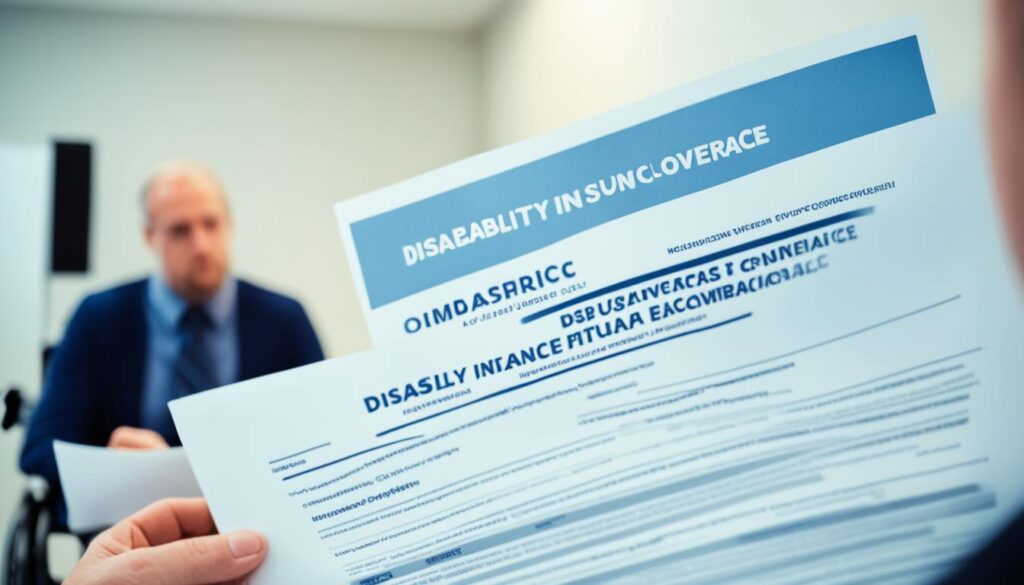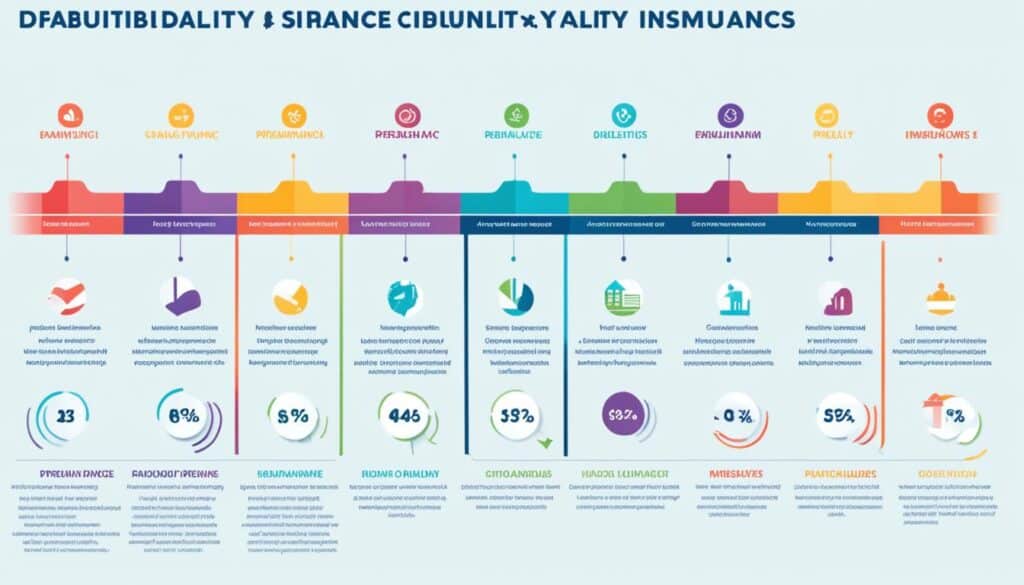Disability insurance is a crucial tool for protecting your income against unexpected illnesses or injuries that may leave you unable to work. With disability income insurance, you can ensure financial security for yourself and your loved ones in times of need.
Understanding the benefits of disability insurance and how it works is essential for taking proactive steps to protect your income and secure your financial future. By knowing the ins and outs of disability insurance coverage, you can make informed decisions and choose the right policy to meet your needs.
Key Takeaways:
- Disability insurance safeguards your income in case of unexpected illnesses or injuries.
- It provides financial security for yourself and your loved ones.
- Understanding disability insurance coverage helps you select the right policy.
- Eligibility criteria and benefit amount vary depending on factors like income and occupation.
- Disability income insurance offers customizable coverage to tailor it to your specific needs.
The Importance of Disability Insurance
Disability insurance plays a critical role in safeguarding your earnings and providing financial security. It ensures that you have a source of income if you are unable to work due to an illness or injury. Without disability insurance, you may risk depleting your savings, relying on government assistance, or even facing bankruptcy. By having disability insurance in place, you can have peace of mind knowing that your income will be protected and your financial future secured.
When unexpected health issues arise, such as a disabling illness or a severe injury, the importance of disability insurance becomes evident. It acts as a safety net, providing a financial cushion to support you and your family during difficult times.
Financial Security in Times of Uncertainty
Disability insurance safeguards your earnings by replacing a portion of your income if you are unable to work due to a disability. This ensures that you can continue to meet your financial obligations, such as mortgage payments, utility bills, and daily living expenses. Without this protection, your income stream may abruptly stop, leading to financial hardship and instability.
By having disability insurance, you can protect your hard-earned savings from being depleted to cover your daily expenses during a disability. Instead of draining your financial resources, disability insurance provides a reliable source of income, allowing you to maintain your lifestyle and preserve your long-term financial goals.
Reliance on Government Assistance
Without disability insurance, you may find yourself relying on government assistance programs, such as Social Security Disability Insurance (SSDI) or Supplemental Security Income (SSI). However, it’s important to note that these programs have strict eligibility criteria and often provide limited benefits. Without proper coverage, you may not qualify for these programs or receive enough financial support to sustain your lifestyle.
It’s essential to plan ahead and secure disability insurance to avoid potential financial reliance on government assistance, as these programs may not adequately meet your needs or sustain your desired standard of living.
Protection Against Bankruptcy
In the absence of disability insurance, experiencing a significant loss of income due to a disability can have severe financial consequences. Medical bills, ongoing treatment costs, and everyday expenses can quickly accumulate, leading to overwhelming debt and the possibility of bankruptcy.
Disability insurance acts as a powerful safeguard against such financial calamities, providing a steady stream of income to cover your expenses and keep you financially afloat. It helps protect your assets, ensures financial stability, and prevents the need to resort to extreme measures to overcome the financial challenges posed by a disability.
Understanding Disability Insurance Coverage

Disability insurance coverage is a crucial aspect of protecting your income and ensuring financial stability in the face of unexpected disabilities. This coverage can be categorized into two main types: short-term disability insurance and long-term disability insurance. By understanding the differences between these types, you can choose the right policy that suits your needs and provides adequate protection for your income.
Short-term Disability Insurance
Short-term disability insurance provides coverage for temporary disabilities that typically last up to a year. This type of coverage is designed to replace a portion of your income during the time you are unable to work due to an illness or injury. Short-term disability insurance acts as a safety net, ensuring that you can still meet your financial obligations and maintain your standard of living until you are able to resume work.
Long-term Disability Insurance
On the other hand, long-term disability insurance offers coverage for disabilities that last for an extended period, often until retirement age. This type of coverage provides more comprehensive protection in situations where the disability is expected to last for a significant period. Long-term disability insurance helps to replace a portion of your income over the long term, ensuring that you can continue to support yourself and your loved ones even if you are unable to work for an extended period.
Understanding the different types of disability insurance coverage is essential when planning for your financial future. Short-term disability insurance provides immediate support during a temporary disability, while long-term disability insurance offers long-term protection in the event of a prolonged disability. By choosing the right combination of coverage, you can ensure that your income is protected regardless of the duration of your disability.
Next, we will explore how disability insurance works and how you can qualify for disability benefits. Understanding these processes can help you better navigate the disability insurance landscape and make informed decisions regarding your coverage.
How Disability Insurance Works
Disability insurance is designed to provide financial protection for individuals who are unable to work due to a disability. Understanding how disability insurance works can help you make informed decisions about your coverage and ensure you have the necessary support in case of an unexpected disability.
Eligibility for Disability Benefits
In order to qualify for disability benefits, you must meet certain eligibility criteria as set by the insurance company. These criteria typically include:
- Proof of disability: You will need to provide medical evidence documenting your disability and its impact on your ability to work.
- Elimination period: Disability insurance includes an elimination period, which is the waiting period before benefits are paid. This period can range from days to months and must be satisfied before you start receiving benefits.
- Benefit period: Disability benefits are provided for a specific duration known as the benefit period. This period can vary depending on the terms of your policy, ranging from a few years to until retirement age.
By meeting these eligibility requirements, you can access the disability benefits provided by your insurance policy.
Determining the Benefit Amount
The benefit amount you receive from your disability insurance policy will depend on various factors, such as:
- Income: Generally, disability insurance provides a percentage of your pre-disability income as benefits. The exact percentage may vary depending on the terms of your policy.
- Occupation: Some policies offer specialized coverage for high-risk occupations, which may provide higher benefit amounts.
- Policy terms: The terms of your disability insurance policy, including any riders or additional coverage, can affect the benefit amount.
It’s important to carefully review the terms of your policy and ensure that the benefit amount aligns with your income and financial needs.
“Understanding how disability insurance works can help you make informed decisions about your coverage and ensure you have the necessary support in case of an unexpected disability.”
Overall, disability insurance works by providing financial protection if you become disabled and unable to work. By meeting the eligibility criteria and understanding the factors that determine the benefit amount, you can navigate the disability insurance process and secure the necessary coverage to protect your income and financial well-being.
The Benefits of Disability Income Insurance

Disability income insurance offers several key benefits. Firstly, it provides income protection by replacing a portion of your earnings if you are unable to work due to a disability. This ensures that you can continue to meet your financial obligations and support yourself and your family.
Additionally, disability income insurance can protect your retirement savings by providing an alternate source of income during a disability. This is particularly important as disabilities can often lead to a loss of income, making it difficult to save for retirement. With disability income insurance, you can have peace of mind knowing that your retirement is secured even if the unexpected happens.
Moreover, disability income insurance policies are often customizable, allowing you to tailor the coverage to your specific needs. Whether you want to adjust the coverage amount, waiting period, or benefit period, customization options are available to ensure that the policy aligns with your unique circumstances.
“Disability income insurance provides not only income protection but also peace of mind, knowing that you are financially secure in the face of an unexpected disability.”
Benefits of Disability Income Insurance:
- Income protection: Replaces a portion of your earnings during a disability.
- Retirement protection: Provides an alternate income source to safeguard your retirement savings.
- Customizable coverage: Tailor the policy to your specific needs and adjust it as your income changes.
| Benefits | Details |
|---|---|
| Income Protection | Replaces a portion of your earnings to ensure financial stability. |
| Retirement Protection | Offers an alternate income source, safeguarding your retirement savings. |
| Customizable Coverage | Allows you to adjust policy terms to meet your specific needs. |
How to Obtain Disability Insurance

Obtaining disability insurance is essential for protecting your income and ensuring financial security in the event of an unexpected illness or injury. There are multiple ways to secure disability insurance coverage that suits your specific needs and circumstances.
Employer-Provided Disability Insurance
Many employers offer disability insurance as part of their employee benefits package. This coverage, commonly known as employer-provided disability insurance, provides a valuable safety net for employees. By participating in your employer’s disability insurance program, you can obtain specific coverage and benefits outlined by your employer.
Employer-provided disability insurance often offers group rates, making it a cost-effective option for individuals who may not have access to disability insurance elsewhere. It is essential to review and understand the terms and conditions of the employer-provided disability insurance policy to ensure it aligns with your needs.
Individual Disability Insurance
If your employer does not offer disability insurance or if you are self-employed, you can purchase individual disability insurance from insurance providers. Individual disability insurance allows you to customize your coverage based on your specific requirements and circumstances.
When obtaining individual disability insurance, you can choose the benefit amount, elimination period, and benefit period that best suits your financial goals and needs. Individual disability insurance provides you with personalized protection and allows you to maintain control over your coverage, even if your employment status changes.
Choosing the Right Option
When deciding between employer-provided disability insurance and individual disability insurance, consider factors such as coverage, cost, and flexibility. Evaluate the benefits and limitations of each option to determine which one aligns best with your current and future needs.
It is crucial to perform thorough research, compare different policies, and seek guidance from insurance professionals to make an informed decision. Obtaining disability insurance ensures your income is protected and provides you with peace of mind during unexpected challenges.
| Employer-Provided Disability Insurance | Individual Disability Insurance |
|---|---|
| Offers coverage as part of employee benefits package | Allows customization based on personal needs |
| May have lower premiums due to group rates | Provides greater control over coverage |
| Benefits may be limited by employer’s policy terms | Benefits are not dependent on employment status |
| May not be portable if changing jobs | Can be maintained even if employment changes |
Factors Affecting Disability Insurance Premiums

Several factors can influence the premiums you pay for disability insurance. It’s essential to understand these factors as they can have a significant impact on the cost of your coverage. By considering these factors, you can make informed decisions when selecting a disability insurance policy and budgeting for the cost of coverage.
Your Age
Your age is one of the primary factors affecting disability insurance premiums. Typically, the younger you are when you purchase a policy, the lower your premiums may be. As you age, the risk of developing health conditions or disabilities increases, which can result in higher premiums.
Your Occupation
The nature of your occupation also plays a role in determining your disability insurance premiums. Occupations with higher levels of risk, such as construction workers or firefighters, may have higher premiums due to the increased likelihood of disability-related claims.
Your Health Condition
Your current health condition can impact the cost of your disability insurance coverage. Pre-existing health conditions or chronic illnesses may increase the likelihood of a future disability, making you a higher risk in the eyes of insurance providers and potentially resulting in higher premiums.
Benefit Amount
The benefit amount you choose for your disability insurance policy can affect the cost of your premiums. Typically, selecting a higher benefit amount will result in higher premiums. It’s important to strike a balance between adequate coverage and affordability when determining the benefit amount.
Elimination Period
The elimination period refers to the waiting period before disability benefits start. The length of the elimination period can impact your premiums. Generally, longer elimination periods can lead to lower premiums, as they shift part of the financial responsibility to the policyholder during the waiting period.
Overall, multiple factors contribute to the calculation of disability insurance premiums. It’s crucial to carefully evaluate these factors and their potential impact on your coverage and costs. By understanding these variables, you can make informed decisions and choose a disability insurance policy that suits your needs and fits within your budget.
Additional Considerations for Disability Insurance

When considering disability insurance, it’s important to take into account additional factors that can impact your coverage and ensure you have comprehensive protection. Here are some key considerations:
Coordination with Social Security Benefits
One important aspect of disability insurance is its coordination with social security benefits. In some cases, disability insurance benefits can work in tandem with social security benefits, ensuring that you receive the maximum amount of support during a disability. This coordination can help bridge the gap between your disability insurance coverage and the income provided by social security, providing you with the financial assistance you need during a disability.
Policy Provisions and Options
Another factor to consider are the policy provisions and options available in your disability insurance coverage. These provisions and options can vary depending on the insurance provider and the specific policy you choose. Common policy provisions include noncancelable policies, which guarantee that your policy cannot be canceled as long as you pay your premiums, and guaranteed renewable policies, which allow you to renew your policy at the end of each term without the risk of being denied coverage due to changes in your health or occupation. Understanding these provisions and options is crucial to ensure you have the level of protection and flexibility you need.
| Consideration | Description |
|---|---|
| Coordination with Social Security Benefits | Ensures you receive the maximum amount of support during a disability by coordinating disability insurance benefits with social security benefits. |
| Policy Provisions and Options | Includes noncancelable policies and guaranteed renewable policies that provide additional protection and flexibility in your coverage. |
By reviewing and understanding the specific provisions of your disability insurance policy, you can ensure that you have the right coverage in place to meet your needs and protect your income effectively.
Also Read : How To Secure Guaranteed Startup Business Loans , No Credit Check Needed
Conclusion
Disability insurance is a vital tool for protecting your income and ensuring financial security in the face of unexpected illness or injury. By obtaining disability insurance coverage, you can safeguard your earnings, avoid depleting your retirement savings, and customize your policy to fit your specific needs. With disability insurance, you can have peace of mind knowing that you and your loved ones will be financially protected in the event of a disability.
FAQs
Q: What is disability insurance?
A: Disability insurance is a type of insurance that provides wage replacement benefits to individuals who are unable to work due to an injury or illness.
Q: What is the difference between short-term and long-term disability insurance?
A: Short-term disability insurance typically provides benefits for a shorter period of time, such as a few months, while long-term disability insurance provides benefits for a longer duration, often extending for years or until retirement age.
Q: How can I qualify for disability insurance benefits?
A: To qualify for disability insurance benefits, you typically need to meet the insurer’s definition of disability, which usually involves being unable to work due to a covered injury or illness.
Q: Why is disability insurance important?
A: Disability insurance can help protect your income by providing you with a source of financial support if you are unable to work due to a disability. It can help cover lost income and expenses during your recovery period.
Q: Can I get disability insurance through my employer?
A: Many employers offer disability insurance as part of their employee benefits package. You may also have the option to purchase additional coverage through your employer or on your own.
Q: Are disability insurance benefits taxable?
A: The tax treatment of disability insurance benefits depends on whether the premiums were paid with pre-tax or after-tax dollars. Generally, benefits from plans paid with after-tax dollars are not taxable.
Q: How do I file a claim for disability insurance?
A: To file a claim for disability insurance, you typically need to contact your insurance carrier and provide documentation of your disability, such as medical records and a doctor’s statement.
Q: What is the definition of disability in the context of disability insurance?
A: The definition of disability in disability insurance policies varies but generally refers to being unable to perform the duties of your occupation or any occupation for which you are reasonably suited given your education, experience, and training.
Source Links
- https://www.guardianlife.com/disability-insurance/short-term
- https://www.investopedia.com/terms/d/diinsurance.asp
- https://www.massmutual.com/insurance/disability-income-insurance